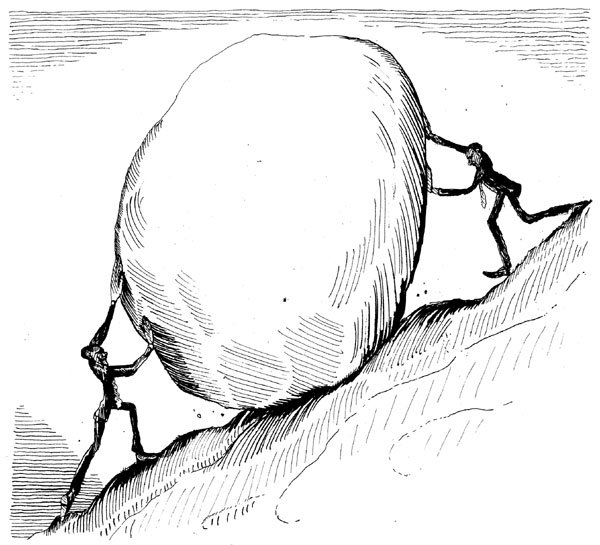
Andrew Bernstein, author of ‘Capitalist Solutions’ and other excellent books, said the following:
‘Nothing is given to man on earth — struggle is built into the nature of life, and conflict is possible — the hero is the man who lets no obstacle prevent him from pursuing the values he has chosen.’
I love this definition of the heroic in the human spirit.
Notice that it doesn’t describe the heroic as self-sacrificial, or self-effacing. That’s what we’re usually taught.
In order to be a hero, we’re told, there’s got to be a disaster. There has to be pain, suffering or torture occurring in some place, in some form. Once you have a disaster or a debacle, then you have a rescuer.
The only way to be a hero is either to rescue another from that torture (often impossible), or to embrace that torture with the suffering person.
Everything I know and believe tells me: This is sick. This is twisted and sadistic.
Think about it. We tell our children that life is good, and that they should strive to be happy. Yet we turn around and, in the same breath, tell them to admire the self-sacrificial as the only high-minded and worthwhile quality in human beings.
We tell children that they must achieve, and that to achieve is admirable. Yet at the same time we tell them that the essence of heroism—of being special and great—is to give up all achievement and fulfillment in the name of self-sacrifice.
And we wonder why even the advanced Westernized world is populated with unhappy, neurotic, conflicted, depressed, substance-addicted and often shallow, even miserable people.
What must a child think? The child is told, in effect: ‘Be happy. But remember that suffering and sacrifice are the only way to be good. Never, ever be selfish.’
Be selfless, but be happy. Now how in the world is this supposed to work?!
Why isn’t achievement of happiness defined as the essence of virtue? And why isn’t the refusal to let obstacles deter one’s pursuit of self-fulfilling values, as Andrew Bernstein points out, the very definition of the heroic?
‘Nothing is given to man on earth.’ How true. The tragedy of too many human beings is their stubborn tendency to follow the myth of the false prophet.
The false prophet is the person, or entity, into which one places all ultimate hope—rather than into one’s own mind, efforts and aspiration. That false entity is always ‘someone’ or ‘something’ else. It’s not based on actual achievement or fulfillment of rational possibilities; it’s based on an uncriticized, undigested ‘somehow.’
People usually say, at least in public, ‘I’m looking for something greater than myself.’ My question is this: How can you experience anything great in the absence of a self?
‘God will take care of me.’ Or Allah. Or the government. Or my family.
Heroism supposedly consists in taking care of another, or others. What of the majority who are to be taken care of, rescued or coddled? Is heroism possible to them, even for a moment in time?
Notice that the conventional definition of the ‘heroic’ always appeals to the human desire to be rescued, cared for, or elevated into a situation where ‘somehow’ there will be no effort.
The popular myth guiding so much of Western society is the myth of the Garden of Eden. (Eastern religions have their own versions, I’m sure.) It’s a place where human beings live amongst vast natural riches, with no effort or thought required.
As fantasized, the Garden of Eden is a mindless existence. No mental or even physical effort is required. This is what so many consider the ideal. That’s the essence of Heaven, Nirvana or any notion of Afterlife. It’s the essence of the political utopias promised by the collectivists of past and present (Barack Obama being the latest false prophet of effortless, mindless ‘hope and change.’)
Given this standard, is it any wonder millions fall—over and over again—for the false prophets and false ideologies who promise such an effortless existence’.if you just pay me the money, or follow my political ideology, or follow my plan to make everything perfect?
These ideas have real consequences. If you’re depressed or living in a chronic state of panic, as so many do, then I’m willing to bet your unresolved conflict between what’s heroic and what’s practical is a part of it. Sociopaths aside, human beings want to be both competent and good.
Our prevailing approach to ‘goodness’ does not permit this.
Bernstein is so right. The true heroic spirit is one in which the individual takes control of his destiny, his existence, and makes life on earth all that it can be. The fulfillment of survival and happiness are the essence of morality. The heroic is the special kind of person who stands especially tall and consistent in that pursuit.
Heroism is about loving and living life—not about sacrificing all that makes life valuable.
Be sure to “friend” Dr. Hurd on Facebook. Search under “Michael Hurd” (Rehoboth Beach DE). Get up-to-the-minute postings, recommended articles and links, and engage in back-and-forth discussion with Dr. Hurd on topics of interest.
